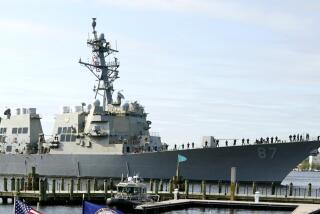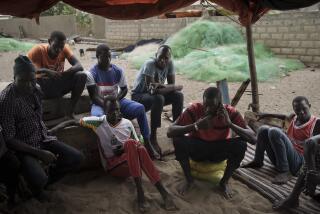Pirates rule Somali coast
- Share via
HARADHERE, SOMALIA — Straddling a wooden crate filled with $1 million in cash ransom, a cranky old pirate bellows names from a notebook as his anxious, bleary-eyed minions lean against the stone walls of their cramped hide-out.
The grizzled buccaneer, chain-smoking Marlboros as he taps into his calculator, checks the notebook again for outstanding loans or fines before counting out each man’s share of the bounty in musty $100 bills paid to release a hijacked Thai ship off the Somali coast.
“Those of us who went to sea and intercepted the boat get $30,000,” said Ahmed Salad, 24, as he waited for his share of the take. “Those who waited on the shore and helped defend us get $20,000.”
When one young thug complains that a $5,000 deduction for disobeying an order is “illegal,” the old man snaps back: “Even the $15,000 you are getting is illegal! It’s all stolen!”
Rampant piracy is the latest, strangest and by far the most lucrative survival technique employed by Somalia’s desperate populace, which has struggled without a functioning government since 1991. Seizing boats on the high seas along this lawless Horn of Africa nation is turning once-quiet fishing villages such as Haradhere into Mafia-style dens of greed and vice.
As the men file out of the room, their wallets fat, they are swarmed by prostitutes, gin hawkers and peddlers of khat, a leaf that people chew for its amphetamine-like stimulant. Special bragging rights go to the young man who can blow through $2,000 in a single evening.
“One night I got $1,000 from a pirate,” a prostitute from Djibouti said. “But the luckiest is to sleep with the group leader. You get $3,000.”
Rising desperation
Some Somalis have long managed to find legitimate means of prospering amid the despair. Even without the rule of law, entrepreneurs have built thriving cellphone networks, cattle export ranches and money transfer businesses. But amid soaring inflation, civil war and rising malnutrition, many Somalis are resorting to almost anything to survive.
Entire villages along the coast now engage in piracy. Unemployed youths provide the muscle. Idle fishermen offer boats and knowledge of the coastline. Foreign businessmen provide the money for guns, radios and satellite phones. Islamic hard-liners are lured by the chance to attack Western interests offshore.
The result is a criminal free-for-all. Pirate attacks off the coast of Somalia have tripled over the last three years, with nearly three a week in 2008, maritime officials say. Currently there are about a dozen hijacked ships, with more than 300 crew members, being held hostage. Ransom payments are often as high as $2 million.
Until recently, the hijackings proved easy. Thousands of cargo ships and tankers pass on the way to Mombasa port in Kenya or destinations in southern Africa. To the north, the Gulf of Aden is a major trade route for the Middle East.
About five years ago, several Somali warlords began attacking illegal fishing boats that had been plundering and polluting the nation’s waters. In 2005, more than 800 illegal vessels from Kenya, South Korea, China and other nations were exploiting Somalia’s coastline.
Then the attackers began targeting humanitarian vessels, including some from the United Nations’ World Food Program. Today, the brazen pirates, calling themselves Somalia’s self-appointed “coast guard,” attack virtually anything that floats, including private luxury yachts and even a U.S. naval boat.
Foreign seafarers usually offer little resistance and make obedient hostages. Somalia’s weak transitional government is powerless to intervene. Ransoms this year alone have topped about $30 million, officials estimate.
But the Sept. 25 hijacking of the Faina may change the rules of the game. The Ukrainian vessel was loaded with 33 Soviet-era tanks and other military hardware. The Kenyan government says it was the buyer, but many believe it was a go-between for the government of southern Sudan.
At first, the pirates thought they’d hit the jackpot. But the prospect of such a large weapons cache possibly falling into the hands of terrorists or rogue nations mobilized the international community. Several NATO warships have joined several U.S. naval vessels and a Russian frigate in patrolling the waters and ensuring that the Faina’s sensitive cargo is not unloaded as negotiations continue. U.S. helicopters regularly hover over the ship and visually inspect every boat to and from the Faina, whose 20-member crew is being held for a multimillion-dollar ransom.
“The ships roam around us every two to three hours and helicopters come close to see what is going on inside the ship,” said Sugule Ali, a spokesman for the pirates.
Foreign efforts
U.N. food-aid ships headed to Mogadishu, the capital of Somalia, are now escorted by foreign warships. The European Union, the U.N. and international maritime groups are trying to come up with a long-term solution to securing Somalia’s waters. Private security companies, including Blackwater Worldwide, the U.S. firm with a controversial record in Iraq, are beginning to market their protection services.
So far the international response has not ended such attacks. Another ship was hijacked this week. The pirates say they won’t be stopped.
“We are just a group of people with a common interest in making money,” said a man who described himself as the chief of the pirates holding the Ukrainian vessel. “We have neither political nor religious ambition. We know it’s illegal, but so is the foreign fishing and dumping of waste.”
The man, who would not give his name, said that even a North Atlantic Treaty Organization presence in the area would fail to deter him. “We will consider NATO as the enemy and take actions against the citizens of any of its member states,” he said.
Perhaps nowhere is piracy’s grip on Somalia more apparent than in Hobyo, a village 300 miles north of Mogadishu with Italian-style architecture from colonial times. Hobyo once thrived from lobster and tuna fishing in the Indian Ocean.
Today, piracy has taken over the village. Women want to marry the pirates and small boys dream of growing up to become buccaneers. Of the town’s 80 fishing boats, all but four have turned to hijacking, local fishermen said.
“I had 25 men working in my boats,” said Sheik Nur Mohammed, who operates one of the four vessels still struggling to earn a living fishing. “They all left me and went to piracy.”
He said he could hardly blame them. Exploitation and pollution caused by foreign fishing and dumping have devastated local waters. Foreigners have raided local fishermen’s nets and used destructive techniques that have killed fish eggs and upset the environment, he said.
“Now we don’t catch enough fish to survive,” said Abdi Mudey, owner of another fishing boat. “We spend all day on the sea and return with barely enough to buy a dish of rice.”
Pirates are now at the top of the town’s social class, the only ones with money for Western-made cigarettes and fancy cellphones. Known by nicknames such as “Superman” or “Flying Squad,” they spend their free time drunk or high on khat.
“Women here don’t talk to you if you are not a pirate,” said Suleiman Farey, 21, a recent high-school graduate. “I’m fed up with these guys.”
But as he played in the water near a hijacked Greek chemical tanker, Hassan Ali, 11, said he couldn’t wait to join a pirate gang so he could earn money to support his family.
His father was a casualty of fighting in Mogadishu; his mother sells tea.
“When I see the men sharing the money, I feel envy,” the boy said. “I pray that piracy will not end before I become a man.”
--
More to Read
Sign up for Essential California
The most important California stories and recommendations in your inbox every morning.
You may occasionally receive promotional content from the Los Angeles Times.










